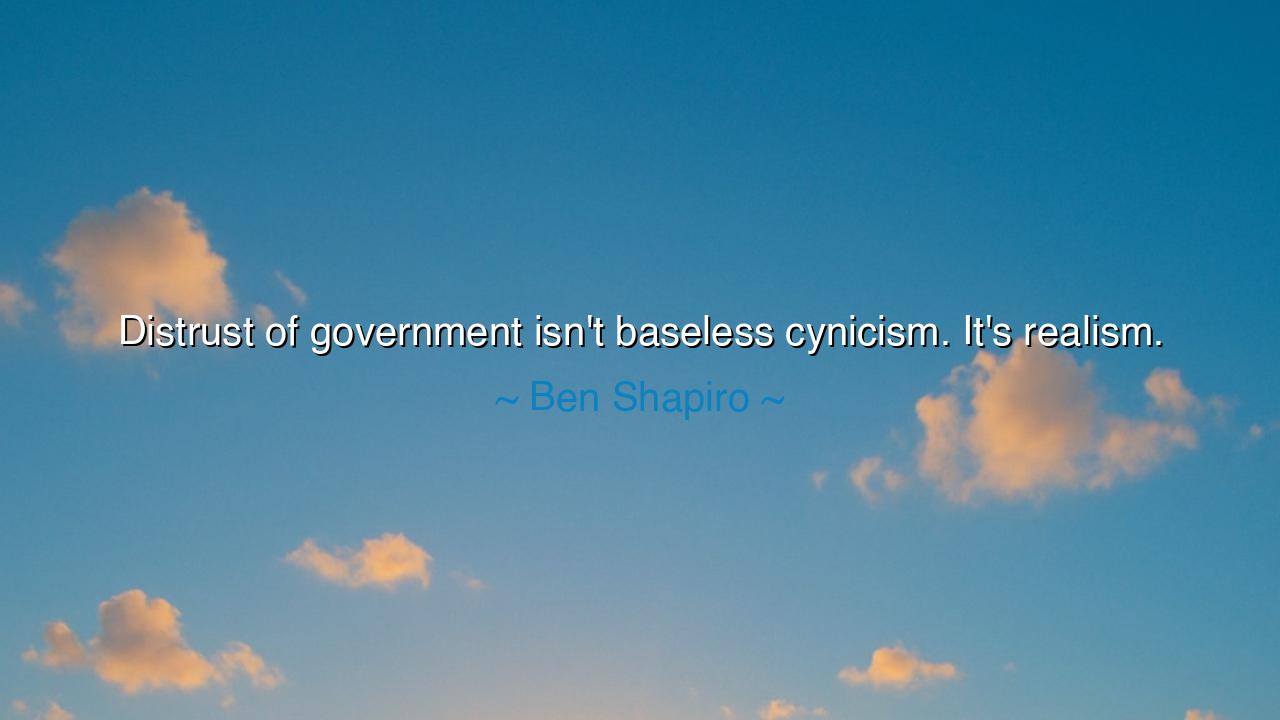
Distrust of government isn't baseless cynicism. It's realism.






The words of Ben Shapiro — “Distrust of government isn’t baseless cynicism. It’s realism.” — resound like the warning bell of an ancient watchman upon the walls of a restless city. They are not the cry of rebellion, nor the sneer of bitterness, but the sober voice of history itself. For as long as men have wielded power over men, freedom has required not blind faith in rulers, but the steadfast vigilance of the ruled. In this saying lies the wisdom of generations — that trust without scrutiny is not virtue, but folly, and that realism, not naivety, must be the foundation upon which liberty endures.
The origin of this quote springs from the timeless tension between authority and individual liberty — a tension as old as civilization. Shapiro, a thinker and commentator of the modern age, voiced what many have felt since the dawn of government itself: that to question power is not to despise it, but to safeguard against its corruption. His words echo the spirit of the Founding Fathers, who, in crafting the American Republic, declared that power must be “chained by the Constitution,” for they knew too well the dangers of concentrated might. From Pharaohs to emperors, from kings to bureaucrats, history has shown that even the well-intentioned may fall prey to ambition when unchecked. Thus, to distrust government is not an act of despair, but an act of prudence — the clear-eyed realism of those who have learned from the ruins of the past.
The ancients, too, understood this truth. When Cincinnatus laid down his sword and returned to his plow after saving Rome, he proved that the greatness of a leader lies not in his grasp of power, but in his willingness to relinquish it. Yet later generations forgot his example. As Rome grew in wealth, her leaders grew in arrogance. Promises of protection became excuses for control; decrees of justice became instruments of domination. The people, lulled by comfort, ceased to question — and in that silence, liberty died. The Republic fell not to an invader, but to its own neglect. Shapiro’s words, though spoken in another millennium, whisper the same lesson: when citizens trade vigilance for complacency, they invite tyranny into their midst.
To call distrust “realism” is to acknowledge the imperfect nature of man. It is to remember that governments, like the people who form them, are capable of both greatness and corruption. Laws may restrain, but temptation persists. When citizens look upon their rulers with reverence instead of responsibility, they transform their government from servant into master. This is not cynicism, for cynicism despairs of virtue altogether; rather, it is the realism of those who believe that virtue must always be defended, tested, and renewed. In the same way that a captain must inspect his ship even after calm seas, so too must a free people inspect their government even in times of peace.
Consider the story of Watergate, when in the 1970s, the faith of a nation was shaken by deceit at its highest levels. For a time, the people believed their leaders incorruptible — until truth tore away the veil. That scandal did not destroy democracy; it strengthened it. The distrust it awakened became the seed of reform, a reminder that liberty’s guardians are not presidents or parliaments, but the people themselves. In that revelation lies the truth of Shapiro’s words: that realism, when grounded in vigilance and guided by principle, is the soul of self-government.
The lesson here is eternal: power must never be worshipped. Respect it, yes; obey it when it is just; but never surrender your reason to it. Governments exist to serve, not to rule, and the moment they cease to answer to their people, they cease to be legitimate. The wise citizen is not the one who trusts blindly, but the one who questions bravely. For questioning authority is not disloyalty — it is the highest form of patriotism. To hold leaders accountable is to honor the sacrifices of those who fought for the right to question them.
Therefore, let every generation remember this truth: freedom is maintained not by faith in power, but by faith in principle. Do not let comfort dull your vigilance, nor partisanship blind your judgment. Listen to your leaders, but test their words against truth. Support your government, but never cease to remind it that it serves at your consent. For realism is not despair — it is hope armed with wisdom. And as long as the people keep their eyes open, their minds sharp, and their spirits free, no government, however vast or proud, can make slaves of them again.
So let Shapiro’s words stand as a torch in the darkness of complacency: “Distrust of government isn’t baseless cynicism. It’s realism.” For in that realism lives the eternal flame of liberty — a fire kindled not by fear, but by faith in the power of truth and the unyielding strength of a free and vigilant people.






AAdministratorAdministrator
Welcome, honored guests. Please leave a comment, we will respond soon